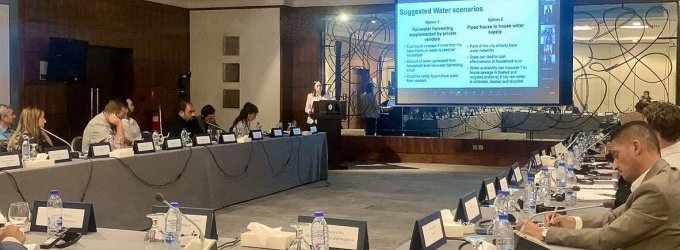Launch of Research: Rethinking humanitarian aid for refugees as investment in urban WASH
Wednesday 14 September 2022.
A research project had its public launch today -in Jordan- with the title ‘The urban refugee dividend – rethinking humanitarian aid as urban WASH investment’ (JURD). The research looks at what could be achieved for refugees and their host communities in future displacement crises, if resources spent on camps were invested in services and infrastructure in urban areas that host refugees. The research brings together engineers and social scientists to focus on water and sanitation (WASH) infrastructure in Jordan, examining water technologies and water access and use together.
Led by the International Institute for Environment and Development (IIED), and funded by the British Academy with the support of the Open Society Foundations (OSF), the project is jointly implemented with the University College London (UCL) and the West Asia-North Africa (WANA) Institute in Jordan.
The research investigates WASH provision in a refugee camp and a refugee-hosting urban centre. It explores the idea that the extensive resources spent on water and wastewater provision in refugee camps in Jordan since the start of the Syrian refugee crisis in 2012, could have provided significant improvements in the quality and quantity of WASH services available to refugees and host populations in urban centres, had it been invested in these places. Moreover, the research explores the potential knock-on impacts on health and time (particularly of girls and women) for education, leisure and livelihoods, if the improvements to urban water and sanitation systems had been made.
The director of IIED's Human Settlements Group, Dr Lucy Earle, said that the aim is to introduce new ideas into policy discussions around refugee hosting in the Middle East and globally, so that future refugee crises can be met with responses that contribute to the resilience and sustainability of towns and cities.
Dr Priti Parikh and Dr Luiza Campos Associate Professors at UCL, and Dr Samer Talozi, water management expert, gave an overview of the background of the project and presented the data collection tools used to understand the current WASH situation. They further explained the alternative water and sanitation scenarios that are being explored.
Participants in the launch event were joined by representatives from local communities, including Syrian refugees and Jordanian hosts, who shared some of the challenges they faced in accessing WASH services. Um Ahmad, a local resident who took part, and who lives in a household that is not connected to the water or sewer network, described the impacts and difficulties of relying on private water vendors for her water supply, including non-dependability and higher costs, leading to WASH debt.
“Our ultimate aim is to adopt sustainable WASH solutions not only in camps but also in host communities by bringing new evidence-based knowledge that can support policy makers, technicians and practicians in transformation toward sustainability and social cohesion” explained WANA’s Sustainable Development team leader, Dr Majd Al Naber. She continued that the “launching event was successful in bringing together diverse perspectives on the topic of equitable water access and water sanitation and hygiene services in Al Mafraq -a refugee hosting community- and Za’atari refugee camp.
Dr Al Naber added that during the upcoming months the research team will conduct key informant interviews with representatives of municipal, national government and water suppliers. Existing data on WASH provision and costs in camp and urban settings will be analysed and complemented with fieldwork in Dahyait Al Malek Abdulla - Mafraq. Primary and secondary data will be gathered and used to develop scenarios demonstrating possible affordable, efficient and equitable improvements to urban WASH provision.

